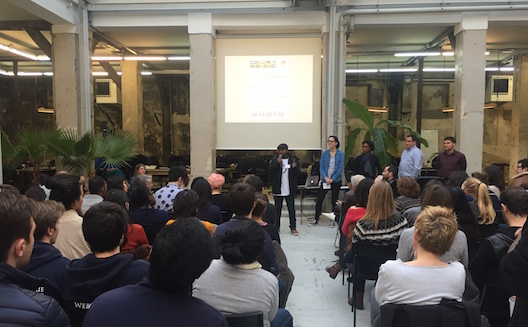Tech solutions for refugees with Techfugees

As the migrant crisis has spread across Europe consciences have been awoken.
What if technology could improve the life of migrants and asylum seekers? This is a question tech-optimists across Europe have been asking themselves.

up to find solutions to the migrant crises. (Images via Wamda)
The latest gathering of tech minds asking this question was in Paris, all looking to help refugees in their path to integration.
The hackathon hosted over 150 people from March 12 to 13, at the coding school Le Wagon, organized with the support of Facebook group Techfugees.
Since being launched by Mike Butcher, TechCrunch’s editor-at large in September 2015, the group has met so much success that it has now became an association organizing events from London to Sydney, including three hackathons.
“Techfugees believes that technology can bring significant firepower because it scales,” Techfugees’ Joséphine Goube told Wamda. “The problem we are faced with right now involves a high volume of people, at a fast rate needing similar things: access to education, information etcetera”.
While this was the first Techfugees event in France, this kind of event wasn’t a first for France. Singa, an association that works toward the integration of asylum seekers and refugees, and co-organizer of this event, held a hackathon last year. For Guillaume Capelle, cofounder of Singa, it’s a sign that this whole mediatization is bearing its fruits.
Four winners
Over the course of the weekend, 11 projects were developed, from an online media platform for refugees, to a smart food platform that allows users to donate food that can then be ordered by refugees.
The jury, which included representatives of Google, NUMA, and the UN, rewarded four projects.
Taking first place was Textfugees, a tool that would allow NGOs and associations to automatically broadcast SMS’s to refugees. Their prize will be incubation at Singa and will take part in the upcoming Techfugees international event.
In second place E-migreats developed a community portal enabling refugees to exchange services.
In joint third were Refugenious who wanted to create a matching platform between refugees and employers, and All Around offered a platform allowing refugees to localize resources and ask questions to help their situations.
Variety of profiles, ideas overflow
If most projects will stay at the prototype stage, odds are some will come to life.
SMS Up is a project that was developed by Urban Refugees during the first Techfugees hackathon that took place in London. This service allows associations to send time-sensitive messages by SMS to refugees. Using their experience, Urban Refugees is now supporting associations helping out refugees living outside of refugee camps in Asia, South America and Africa. They’re currently raising funds via a crowdfunding campaign.

Still, this sort of event goes beyond prototyping.
Techfugees managed to gather developers, civil society players, journalists specialized in refugee stories, government employees, and refugees. Participants could also get advice from of an impressive number of startup community members, refugee organizations, like the UNHCR, who came to help the project holders and spot projects they could support - all players that often don’t get to meet.
“It’s so rare to have all the stakeholders of a problem together, motivated, around a table,” explained Abdessamad Idzina, digital project manager at S'team Management. “Yet, as we can see, especially on this crisis, co-building is the only way to build innovating solutions that shake the status quo.”
Communication issues and lack of internet connection
Contrary to popular belief, Syrians only represent part of the asylum seeker numbers coming to France, and Europe as a whole. Afghans, Somalis, Iraqis, Sudanese, Eritreans, Pakistanis make the most of the bulk.
Few freshly arrived refugees speak French. Some speak English, but most only speak their mother tongue - Arabic - but there is also Dari, Tigrina, and Ourdou.
Over the hackathon weekend, project holders almost all deployed their solutions in French, English, and Arabic. But this wasn’t enough and several teams chose to develop solutions enabling migrants to understand, and be understood.
As an example, Syrians are known for being connected to internet via smartphones, however, this isn’t the case for refugees coming from Africa, for example. This led many of the project holders to develop SMS solutions rather than internet websites or apps.
Showcasing refugees success stories
Throughout the weekend, refugees and asylum seekers were invited to talk about their challenges, and to show the benefits of refugee inclusion in their adoptive countries.
On the first day, Carlos Arbelaez, president of Singa, talked about the obstacle course that was his moving to France after fleeing from Colombia.

On the second day, it was the food served at the event that brought the attention of participants. The Cuistots Migrateurs offers world cuisine cooked in Paris by refugees. On the Sunday, Sriyani from Sri Lanka and Khaled from Syria, treated attendees to mezzes and currys.
Other asylum seekers are also hoping to find success. Half a dozen refugees took part in the event, and all are members of the first edition of Refugeeks, established to help refugees learn to create websites and web applications, supported by Singa and the coding school Simplon. Once the relevant papers are in their pockets they are hoping to find jobs as developers.
In the coming months Techfugees is looking to plan more hackathons, and this time closer to refugee hotstposts like Lesbos or the Balkans.


